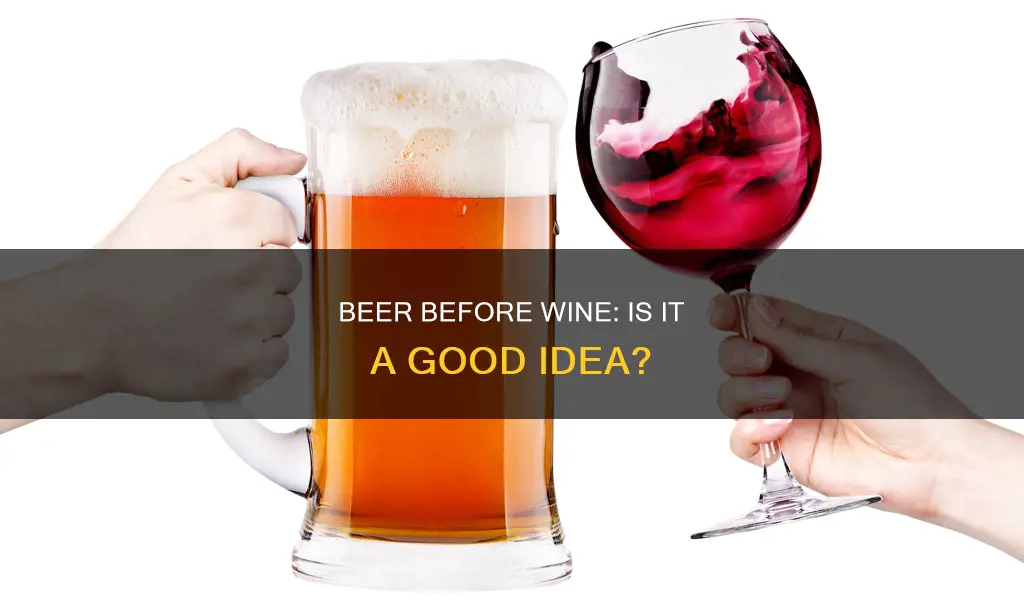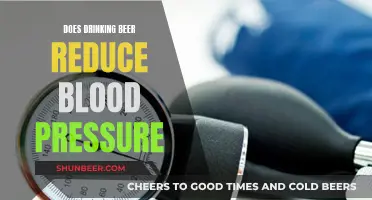
Beer before wine and you'll feel fine; wine before beer and you'll feel queer is a well-known saying that suggests the order in which you consume alcoholic drinks matters. However, scientific studies have been conducted to test the validity of this claim, and the results suggest otherwise. Researchers from Witten/Herdecke University in Germany and the University of Cambridge in the UK recruited 90 volunteers between the ages of 19 and 40, divided them into three groups, and assigned drinking orders to test the impact on hangover severity. The findings indicated that the order of consumption had no significant impact on hangover intensity, and that drinking too much of any alcoholic beverage is likely to result in a hangover.
| Characteristics | Values |
|---|---|
| Common saying | Beer before wine and you'll be fine; wine before beer and you'll feel queer |
| Truth | There is little scientific evidence to support the saying |
| Factors affecting hangover | Amount of alcohol consumed, vomiting, perceived drunkenness, genetics, not drinking enough water, not eating while drinking, smoking while drinking, taking certain medications, quality of sleep |
What You'll Learn

Beer before wine, you'll be fine
"Beer before wine and you'll be fine; wine before beer and you'll feel queer." We've all heard this saying, but is there any truth to it? Well, it turns out that it's just a myth!
According to a study by researchers at Witten/Herdecke University in Germany and the University of Cambridge in the UK, the order in which you consume alcoholic drinks doesn't matter when it comes to hangovers. The study, published in the American Journal of Clinical Nutrition, found that regardless of whether participants drank beer followed by wine or vice versa, there was no significant difference in hangover severity. So, whether you start with beer or wine, you're likely to end up with a hangover if you overindulge.
The idea behind the saying may be that wine tends to be stronger than beer, so starting with wine might lead to drinking more overall and a worse hangover. However, this doesn't seem to be supported by the evidence. Another theory is that carbonation in beer causes faster absorption of alcohol from wine, leading to increased intoxication and a worse hangover. But again, this study didn't find any evidence to support this claim.
So, while "beer before wine, you'll be fine" may be a catchy phrase, it's not necessarily true. The total amount of alcohol consumed and individual factors such as genetics, hydration, and food consumption are more likely to influence how you feel the next day. As the saying goes, "the best way to avoid a hangover is to not drink at all"!
However, it's important to remember that hangovers are complex and not fully understood. While the order of drinks may not matter, other factors such as ingredients, gender, and individual differences can influence how you feel. So, it's always a good idea to drink in moderation and listen to your body.
Drinking Non-Alcoholic Beer While on Plavix: Is It Safe?
You may want to see also

Wine before beer, bad idea?
A study published in the American Journal of Clinical Nutrition in 2019 set out to scientifically evaluate whether drinking beer before wine or vice versa had an impact on hangover severity. Ninety volunteers between the ages of 19 and 40 were split into three groups. The first group consumed two and a half pints of beer followed by four large glasses of wine. The second group consumed the same amounts but in reverse order. The third group acted as a control and consumed only beer or only wine. The study used a crossover design, with participants in the first and second groups switching drink orders a week later.
The researchers found that the order of alcoholic drinks did not significantly affect hangover intensity. Instead, they concluded that drinking too much of any alcoholic beverage is likely to result in a hangover, regardless of the order. They also found that vomiting and perceived drunkenness were better predictors of hangover severity than the order of drinks.
Another study, conducted by Harvard Health, found similar results. They enrolled 90 adults and randomly assigned them to one of three groups. The first group drank beer until their breath alcohol level was at least 0.05%, then drank wine until it was at least 0.11%. The second group did the opposite, while the third group drank only wine or only beer. The groups were similar in terms of gender, body size, drinking habits, and hangover frequency. The study found no correlation between hangover symptoms and whether subjects drank only wine, only beer, or switched between them in either order.
So, is wine before beer a bad idea? Based on the available scientific evidence, the order of your drinks is not a significant factor in determining how bad your hangover will be. However, it is important to remember that drinking too much alcohol, regardless of the order, can lead to unpleasant hangover symptoms. As always, drink responsibly and in moderation to reduce the risk of negative consequences.
Beer and Wine: Low-Carb Diet Friends or Foes?
You may want to see also

The science behind hangovers
While the exact mechanism behind hangovers remains a mystery, there are several factors that are believed to contribute to the unpleasant experience. Firstly, alcohol is a diuretic, which means it increases urination and fluid loss, leading to mild dehydration. This dehydration can result in symptoms such as thirst, fatigue, and headaches. Additionally, alcohol disrupts sleep patterns, preventing people from reaching the deep stages of sleep necessary for the body to fully restore itself.
Another factor is gastrointestinal irritation. Alcohol irritates the lining of the stomach and increases acid release, leading to nausea, stomach discomfort, and abdominal pain. The release of acetaldehyde, a toxic byproduct of alcohol metabolism, can also cause nausea or vomiting. Acetaldehyde exposure also contributes to inflammation in the liver, pancreas, brain, gastrointestinal tract, and other organs. This inflammation may play a role in the overall malaise associated with hangovers.
The order in which you consume alcoholic drinks, such as beer and wine, does not seem to have a significant impact on hangover severity. A study by Harvard Health Publishing found that there was no correlation between hangover symptoms and the order in which participants drank beer and wine. However, the total amount of alcohol consumed has a much bigger effect on how you feel the next day.
To ease hangover symptoms, staying hydrated and drinking electrolyte-rich sports drinks can help with dehydration and electrolyte imbalance. Consuming bland foods or fruits can help raise blood sugar and relieve nausea. While there is no magic cure for a hangover, drinking in moderation or abstaining from alcohol altogether is the best way to prevent the unpleasant after-effects.
Beer and Breastfeeding: What's Safe?
You may want to see also

Alcohol absorption rates
The absorption rate of alcohol is influenced by various factors, including the concentration of ethanol (EtOH), the presence of food in the stomach, carbonation, and individual characteristics such as gender, mood, physical condition, and medication use. Here is an overview of the key factors affecting alcohol absorption rates:
Ethanol Concentration
The concentration of ethanol in a beverage impacts the rate of gastric emptying and absorption. Higher concentrations of ethanol in a drink can delay gastric emptying, especially after consuming a meal. In general, diluted alcoholic beverages with lower ethanol concentrations, like beer, are absorbed more slowly than beverages with higher concentrations, such as whiskey or vodka.
Food Consumption
Consuming alcohol on an empty stomach allows for faster absorption of ethanol. Food, especially greasy, high-protein, and fatty foods, slows down the rate of intoxication by causing the pyloric valve at the bottom of the stomach to close during digestion, preventing alcohol from entering the small intestine, where absorption occurs more rapidly.
Carbonation
Carbonated alcoholic drinks, like beer, increase the rate of alcohol absorption due to the pressure inside the stomach and small intestine, forcing alcohol to be absorbed more quickly into the bloodstream.
Individual Characteristics
Factors such as gender, mood, physical condition, and medication use can influence alcohol absorption rates. For example, women tend to have higher levels of estrogen, body fat, and lower levels of body water than men, which can affect the amount of alcohol absorbed into tissues and the rate of absorption.
Beverage Type
The type of beverage, including beer, wine, or spirits, can impact the rate of absorption and peak blood alcohol concentration (BAC). Vodka/tonic, for instance, leads to a significantly higher BAC than wine or beer, and the time to reach peak BAC is also faster with vodka/tonic.
Beer and Prediabetes: What's the Verdict?
You may want to see also

The impact of drinking order on hangovers
The saying goes, "beer before wine and you'll feel fine; wine before beer and you'll feel queer." But does the order in which you consume alcoholic drinks really matter when it comes to hangovers?
The truth is, the total amount of alcohol you consume will have a much more significant impact on how you feel the next day than the specific order of drinks. A 2019 study at Cambridge University found that volunteers who drank beer followed by wine reported the same severity of hangover symptoms as those who drank wine first and then beer. So, whether you drink beer, wine, or a combination of the two, it is the overall quantity of alcohol that matters most in determining the severity of a hangover.
However, there are a few theories as to why starting with wine might lead to a worse hangover. One idea suggests that the carbonation in beer causes you to absorb alcohol from the wine more quickly and easily, leading to increased intoxication and a worse hangover. Another theory posits that parties where wine is served first are more likely to get out of hand, as people tend to get drunk faster on stronger drinks and lose track of how much they've consumed.
Ultimately, the best predictor of a bad hangover is how drunk you feel and whether you vomit after drinking. To minimize the chances of a hangover, it is important to drink responsibly, know your limits, and avoid excessive consumption.
Wisconsin's Drinking Laws: Beer and Underage Drinking
You may want to see also
Frequently asked questions
No, this is just an age-old saying. A study by the University of Cambridge found that drinking beer before wine does not give you a milder hangover than the other way around.
Hangover symptoms occur when higher-than-normal blood alcohol concentrations drop back to zero. The underlying causes are thought to include dehydration, the immune response, and disturbances to metabolism and hormones.
The best way to avoid a hangover is to drink responsibly and in moderation. The amount of alcohol you consume will have a much bigger effect on how you feel than the specific order of drinks.
There are no effective remedies for hangovers. However, societies often rely on folk remedies like "hair of the dog" and old sayings such as "beer before wine and you'll feel fine".
Some people suggest that colourings and flavourings in alcoholic drinks can make hangovers worse. For example, at the same alcohol concentration, Bourbon tends to cause a more severe hangover than vodka.







